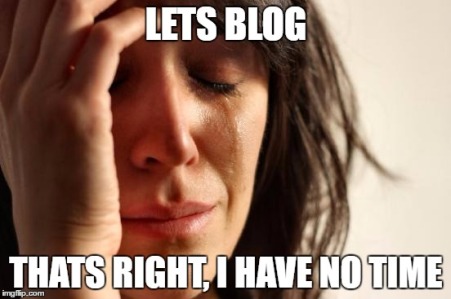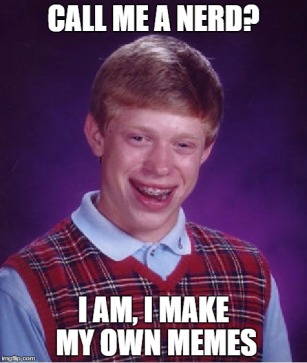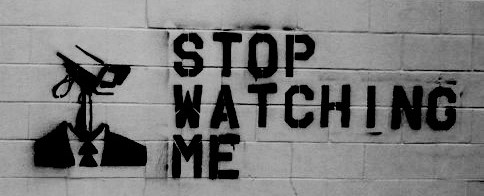Throughout this process of blogging I have discovered two things:
- I love to blog.
- I don’t have time to blog.
It’s so ironic; if I loved to blog I would make time to blog? Josh Pulman in his Somewhere Else project states “Everywhere we go, we carry with us options far more enticing than the place and moment we happen to be standing within.” Maybe I procrastinate by choosing to focus my attention elsewhere, or maybe I really just don’t have enough time in the day?

Source Image: (MemeGenerator, 2016)
In this crazy and demanding lifestyle we now lead, there is a key gap between what we want to do, what we should do and what we actually do. As you can see, my blog comprises many elements that each allude to different interests.
- “About Myself” – to let readers into what I believe in and give them the opportunity to really trust my thoughts and let them know about my genuine self.
- “Travel” – to keep an updated space of trendy, hidden spots to discover and also includes cultural variances in foods, meanings of special calendared events etc.
- “Resume” – to allow potential employers to learn about my style of writing and interests and in the hopes of providing a professional account of my work.
- “Study” – this includes controversial subject matter ranging from cultural competence to same-sex marriage and from sex sells to ‘pornographic images’ of children.
Task 1 feedback
In my blog “Have we just regained faith society?”, I was given constructive feedback early which shaped my future blogs. The strongest resonation I made with this feedback was how I was commended on closing my blogs with an optimistic concept. This blogpost was very truthful and in saying so had some very negative aspects towards society’s adaptive values and cultural doings. Hence, when I stated that “A world filled with listening can only mean a world filled with shared learning”, allowed my readers to end on an up-note. Although I do not close with a ‘happy’ notion each time, I always attempt to leave my viewers questioning, so they can have their own, independent thought process.
I was advised to re-read my work as there were minor errors such as missing page numbers in citations (something I am not in routine of doing!). Something that is incredibly important in which I have not been doing, is sourcing images I find on the internet. After being made aware of this crucial mistake I now use free creative commons images which do not require any sourcing or source any images I do not own.

Source Image: (MemeGenerator, 2016)
Reaching out to potential readers
“The media reaches over a 100 million people a day” (Social Media Statistics, 2016) and gravitates great power to be able to change public opinion and revolutionize history. WordPress is a successful platform to project my message and proves that regulating media is very difficult.
I have a total of 128 followers on my WordPress and 226 Twitter followers which is linked to my WordPress. According to my WordPress statistics, I have had a total of 1,813 views on my blog which is great considering my blog has only been active for under 2 years. My blog has been universally visited from over 28 countries including India, South Korea, France, Vietnam and South Africa. Similarly, by commenting on others blogs, it has opened the doors to more repeat readers. For example, I commented on Sam’s blog, and he voluntarily followed my blog and begun liking my travel posts.
The overall aim of my blog is to inform my readers and also create thought-provoking conversations so that taboo subjects can be voiced. I pride myself on finding educational links and scholarly articles to back up my arguments. This was noted in my feedback as having “outstanding value added through quality links and features”, which is the point of my blog: to have accessible information provided to my viewers to make ‘learning’ convenient and hence gain repeat viewers. The following video discusses the balance between sensitivity and truth when it comes to speaking about taboo and often polarizing topics.
Engaging with the ideas covered in BCM240
There are many engaging concepts in Media, Audience, Place and allows for independent thought and research in areas you wish to explore further. “Space has the capacity to host multiple meanings for different users, at the same time.” (Michel Foucault, Of Other Spaces). This is the underlying concept for my whole blog, using space as a metaphor for my WordPress, as my blogs resonate differently with each audience.
I always use academics to support my viewpoints or contradict different stances on a theme. I have used my blog to transcend ideas that can be interpreted dissimilarly and can be open to elucidation. I hope my blog is easily accessible to everyone, and above all, is of interest. I have incorporated multiple videos, links and visually appealing content to attract audiences and show how background research and further research can aid ones understanding of a newfound topic.
Therefore, assisting research found in my blogposts were aimed to show that MY ideas have consistency and are based off valid arguments. Content I post is controversial, and by any means debatable, but that is my aim. To me, there is no point in having a blog that identifies what we already know; moreso highlight how we could lead the future in a different light. Colberg makes a valid statement when he explains “The public’s wariness of having photographs in public spaces taken without permission poses a challenge for photography as much as an opportunity to talk about what photographs can do and how they can do it”. So, by making aware contentious topics, I am also presenting an opportunity for discussion.
 Source image: (Michalski, 2015)
Source image: (Michalski, 2015)
Constructively addressed problems
The biggest thing I have learnt which I addressed earlier was time management. Trying to juggle what we are required to write about and what I want to write about in my leisure is proving challenging. Yet, knowing I am passionate about all topics I have written about and topics I have clearly chosen myself is reassuring as I am not just doing something for the sake of obligation.
Equally, trying to initiate interaction through blogging can be problematic as simply some people may not be interested in your content or style of writing or purely have not come across your blog. I have attempted to address this problem by tagging many related topics to acquire as many people as possible and keep my blogging modern and appropriate for a wide variety of people. I feel I have a strong, confident blogging voice as a research communicator and have acquired many skills to become a liable professional on the web.
I leave you with a quote that the genesis of genius; Albert Einstein, said, that I believe is the ultimate root for success and liveliness in what we can sometimes fall guilty to in our mediocre lives “I have no special talents. I am only passionately curious.”
References
Berg, C 2014, “Time to ditch antiquated media regulations”, ABC News, viewed 26 September 2016, <http://www.abc.net.au/news/2014-03-11/berg-time-to-ditch-antiquated-media-regulations/5311800>
Colberg, J 2013, ‘Ethics of Street Photography’, Conscientious Extended, viewed 26 September 2016, <http://jmcolberg.com/weblog/extended/archives/the_ethics_of_street_photography/>
Corbett, J 2001, ‘Torsten Hӓgerstrand, Time Geography CSISS Classics’, Center for Spatially Integrated Social Science, p.1/pp.4
Foucault, M 1984, ‘Of other spaces: Utopias and Heterotopias’, Architecture, Movement, Continuity, p.1/pp.9
Pulman, J 2016, “Reasons to Use a Photographer”, Josh Pulman, viewed 2 October 2016, <http://www.joshphoto.com/projects/somewhere-else/>
Wihbey, J 2013, “Multitasking, social media and distraction: Research review”, Journalist’s Resource: Research on today’s news topics, viewed 15 September 2016, <http://journalistsresource.org/studies/society/social-media/multitasking-social-media-distraction-what-does-research-say>